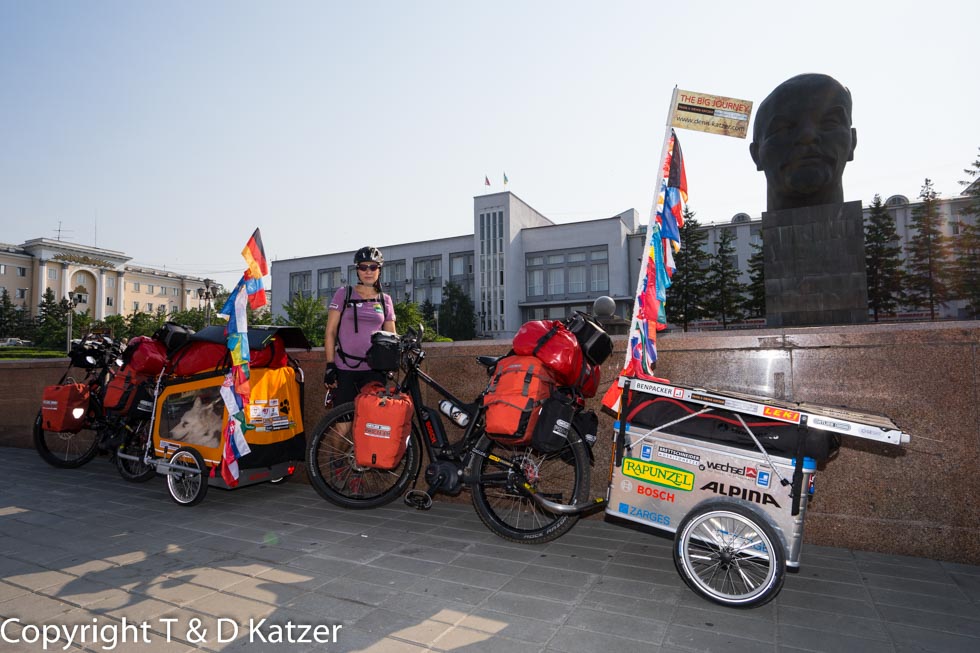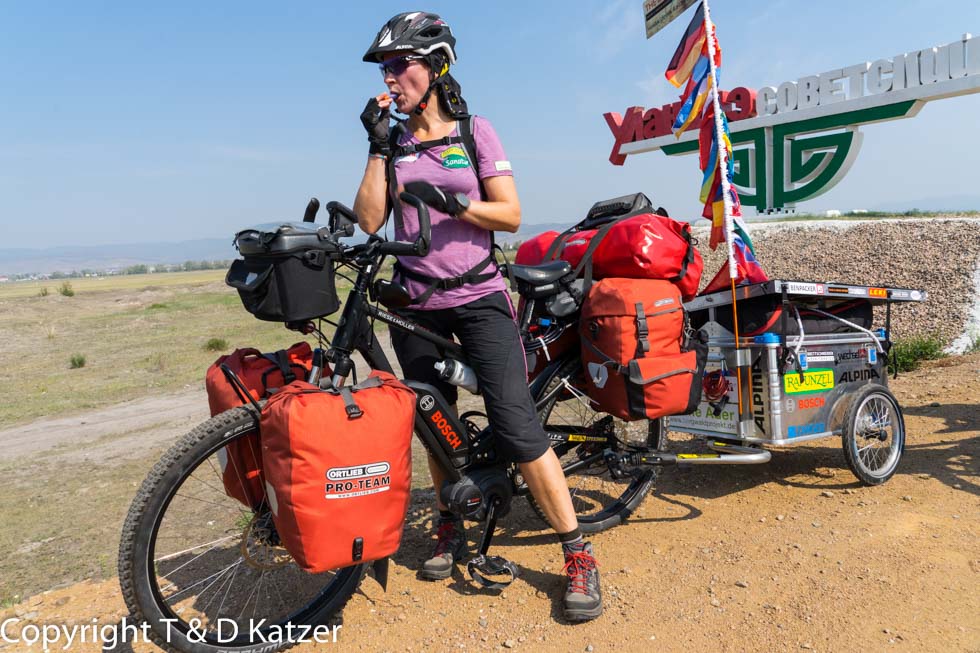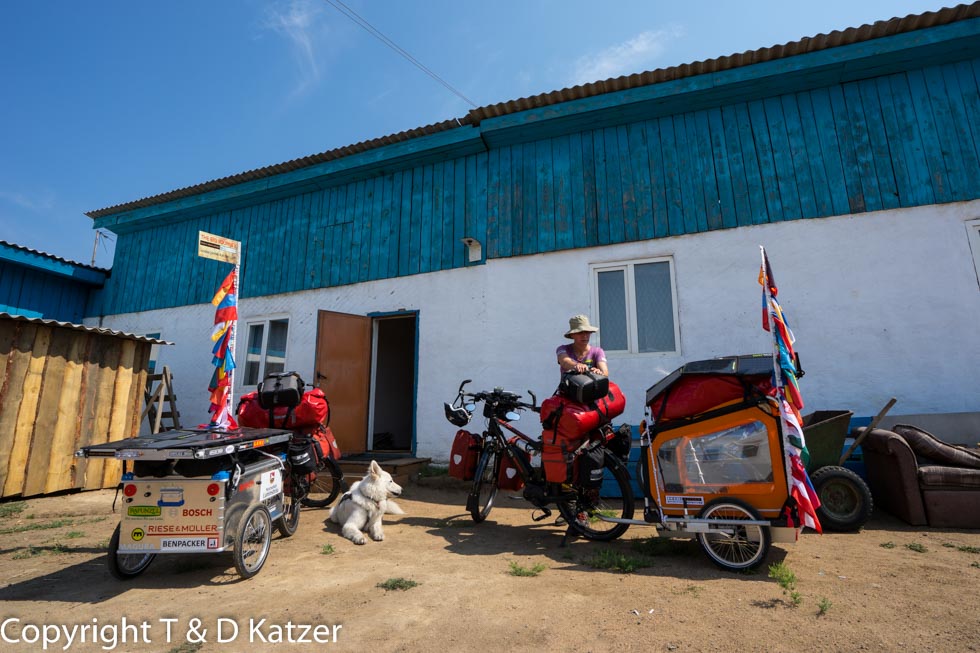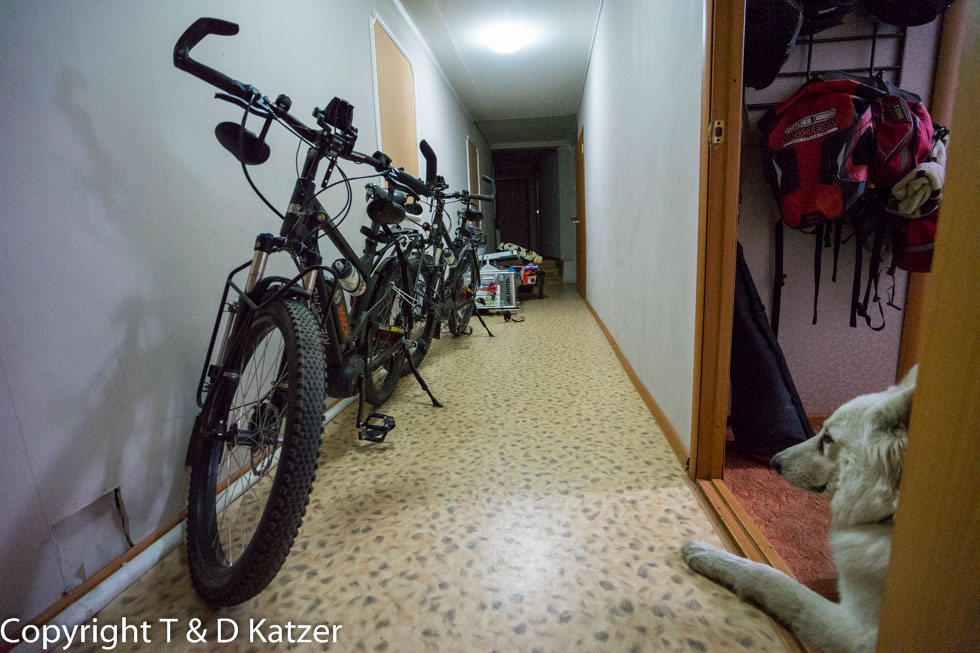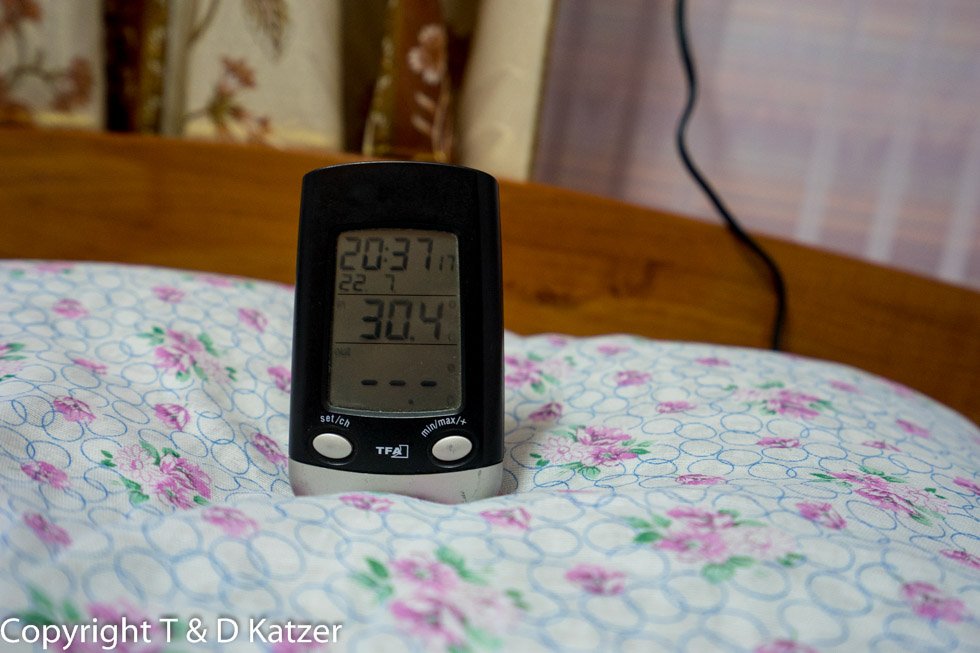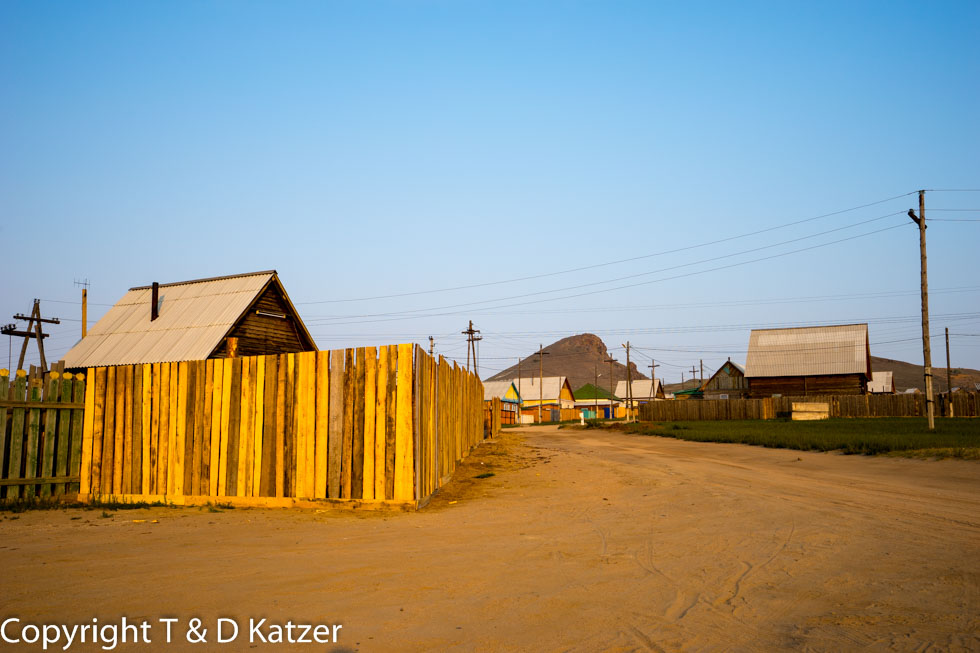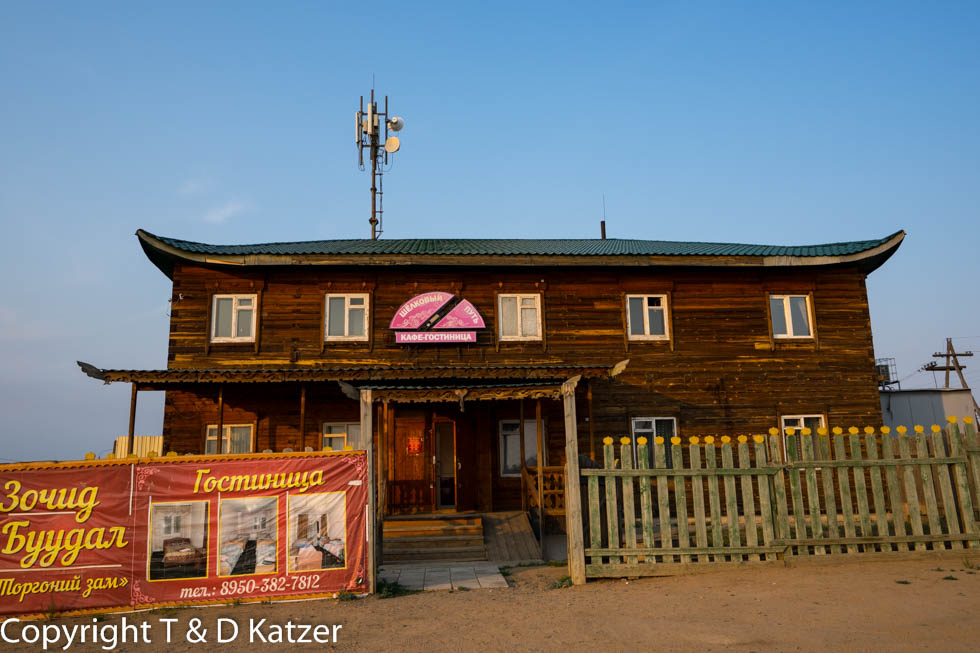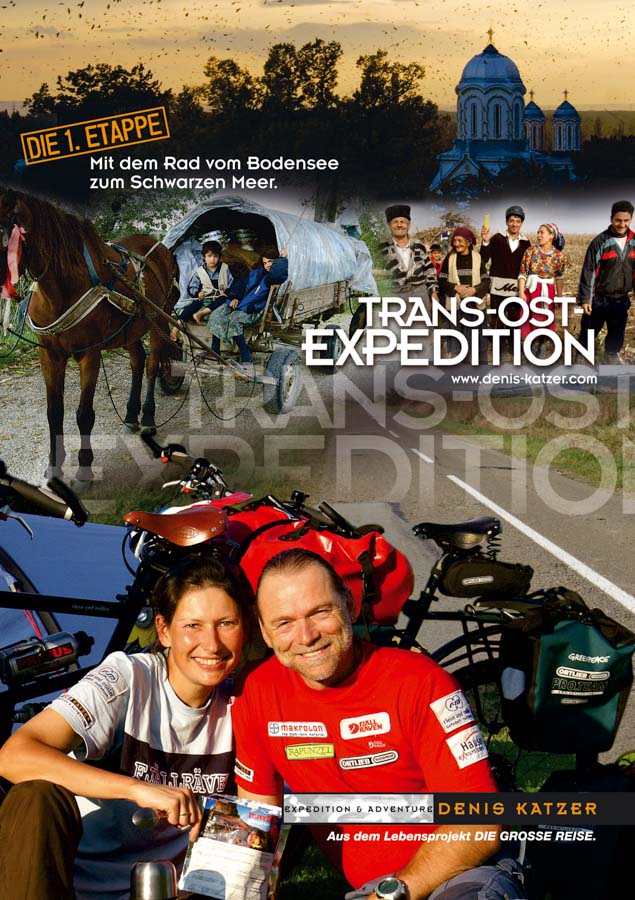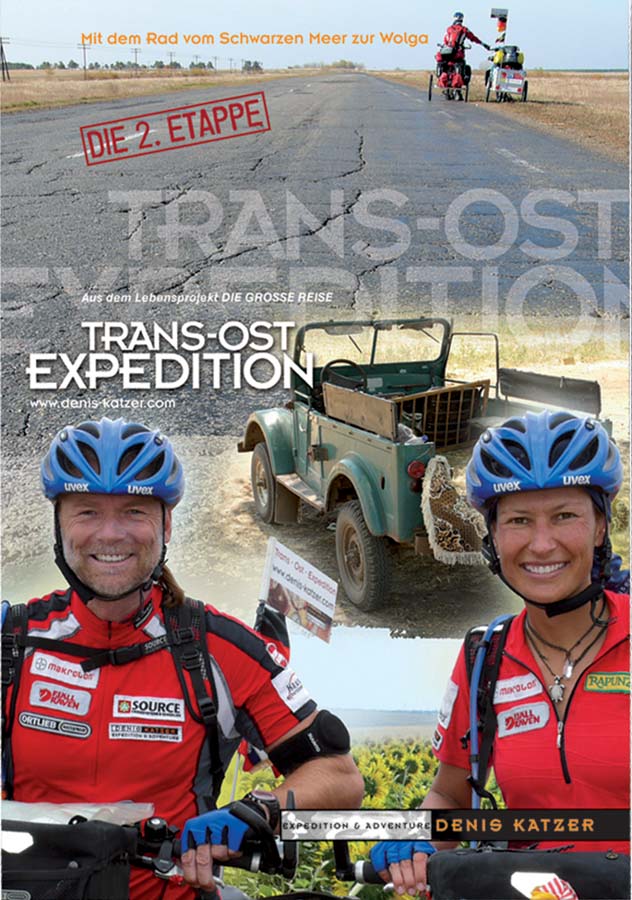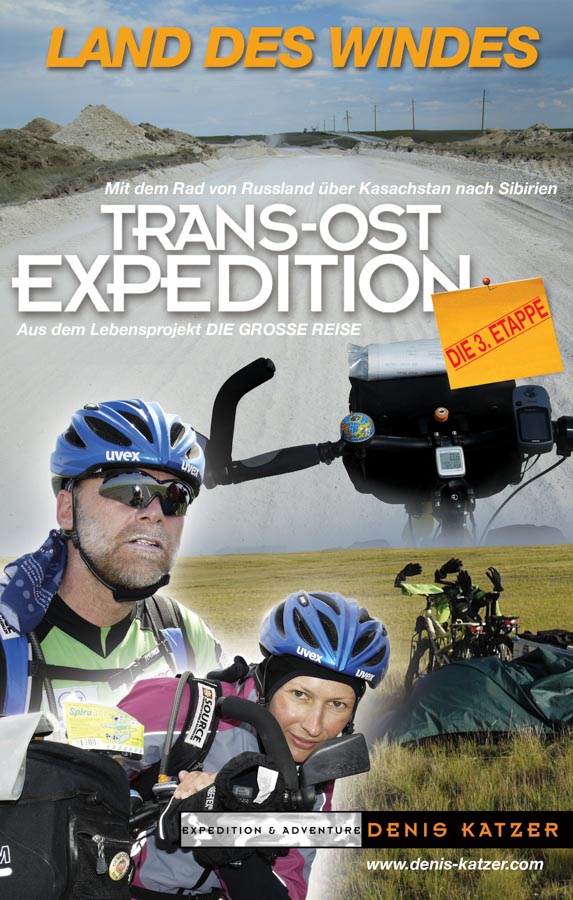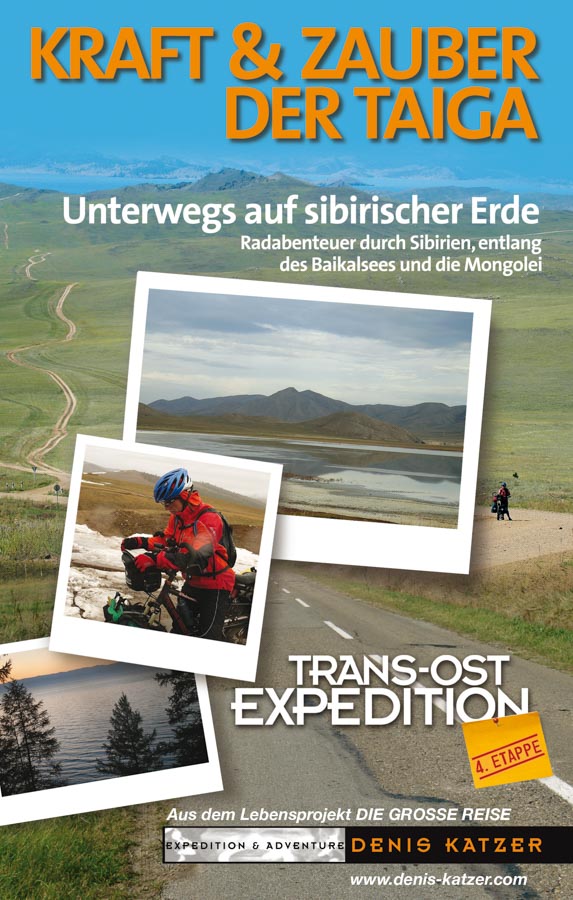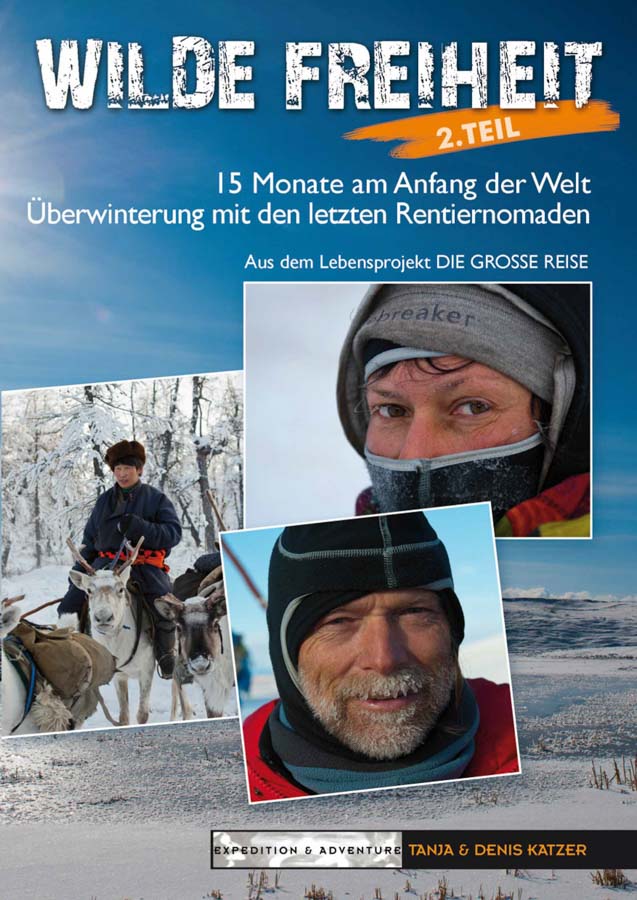
Hot start
N 51°44'43.8'' E 107°17'10.3''
Day: 24
Country:
Russia / Siberia
Location:
Ivolginsk
Latitude N:
51°44’43.8”
Longitude E:
107°17’10.3”
Kilometers per day:
31
Total kilometers:
8,086
Aver. Sib.
15 kmh
Temperature day max:
56 ° in the sun
(Photos of the diary entry can be found at the end of the text).
Today is the day. We are finally setting off. This time we won’t be loading anything, transporting anything, going on a test trip or cycling a short distance to change accommodation. This time we are actually setting off on our long-planned e-bike tour. To avoid the heat a little, we have breakfast at 6:00 in the morning. The temperatures are still pleasant. Tanja and I carry the first saddlebags down from the second floor and while I get our bikes ready, Tanja hauls in the missing equipment. Then she takes Ajaci for a walk. Because I’m not yet experienced and still have to make a few adjustments to the saddlebags so that they don’t scrape against the fork, it takes over an hour until we’re ready to go. “Daßwidanja i charascho putascheswiee!” (Goodbye and have a good journey), calls out to us the friendly Buryat woman who is responsible for registering guests and keeping the rooms clean in this guesthouse (accommodation, hotel). “Da ßwidanja!”, we reply, laughing and nervous at the same time. “Third gear and Eco step”, I say to Tanja to get our heavily laden road train moving from a standing start without the weight knocking us to the ground in the first few meters. “All right?” I ask. “Yes, everything’s fine,” she replies. Then, for the first time on this trip, we let the cranks spin south towards the Mongolian border. Still a little unsteady, we juggle the bikes and trailer around the holes in the asphalt. Ajaci squeaks and whines. Although we have already trained him to ride a trailer, it still takes some getting used to. “We have to turn right over there!” Tanja calls out. “Yes, I know,” I reply and steer onto the main road. The first cars honk at us. The drivers laugh amiably and hold their fists out of the window with their thumbs up. “Malazee! Malazee!” (Fantastic! Fantastic), some of them shout, which makes us feel like little heroes. Because we have already cycled 15,000 kilometers from Germany, Austria, Slovakia, Hungary, Serbia, Romania, Moldova, Ukraine, Russia, Kazakhstan and Siberia to Mongolia on our bikes without electric assistance, we know how well-disposed the Russians are towards athletes. (See books Trans Ost 1 to 4)
Link to the books click on the respective picture
We know how highly regarded long-distance cyclists are in these countries, especially in Kazakhstan and Russia. “Isn’t it great?” Tanja exclaims with a laugh. “But yes!” I reply, overjoyed to be on the road again. We let our electrified tricycles roll onto the square where Lenin’s giant head stands to record our presence in Ulan Ude right in front of it. “Vy mozhete vzyat’ fotografii s nami?” (Can you please take our picture) I ask a man who looks trustworthy and hand him our precious camera. “Охотно”, (gladly) he says. We place our bikes in front of the head of the revolutionary, Marxist theorist and founder of the Soviet Union, laugh into the camera, thank the gentleman and leave the capital of the Russian republic of Buryatia.
Drivers are considerate and usually overtake us in a wide arc. “Malazee! Malazee!” (Fantastic! Fantastic) continues to be shouted and the horn is honked as if we were about to get married. We are really touched to be bid farewell by the people of Ulan Ude.
“Tourist?”, we hear again and again, not without noticing the special emphasis with which this word is pronounced here. There is something almost admiring, longing, passionate about it. There is a sound in this word that reminds us again and again what an extraordinary gift it is to be able to travel and see the world with our own eyes. Most Siberians never get the chance to leave their region, let alone visit a foreign country, for the rest of their lives.
“Gdje nachoditza ulitsa Iwolginsk?” (Where is the road to Iwolginsk), we ask from time to time so as not to take any unnecessary detours. Then we find ourselves on the A 165 highway, where drivers on both sides of the road greet us with their horns. At first we feel honored, but after a while we are startled when a large truck almost blows us off the saddle with its loud horn, only to wave in a friendly manner. There is a group of motorcyclists at a petrol station. They look towards us in increasingly hot temperatures. They immediately stop everything and pull out their cell phones to take photos of the colorful bicycle road trains. We stop briefly so that they can get better pictures. “Where are you from?” they ask in English. “From Germany,” we reply. “With the bikes?” “Yes, we cycled all the way to Mongolia and spent the winter there with the reindeer nomads.
Now we continue our cycle tour,” I explain. “Back to Mongolia?” they want to know. “Yes, but this time we want to go to China and Vietnam. We’re going to cross Mongolia,” say the interesting-looking men, some of whom come from Mongolia, Japan and Russia. We say goodbye and drive on towards Ivolginsk.
10:20 am. The sun scorches the land with its mercilessly hot rays. Everything around us is dry and parched. Who would have thought that it could get so hot in Siberia? To get to know our system, we are still riding on the lightest support level, Eco. Our on-board computer has five levels. No support, Eco, Tour, Sport and Turbo. We still don’t know how many kilometers a battery will last in this monkey heat, on the sometimes bad roads and with the enormous payload of approx. 150 kilograms each. (including 35 kg Ajaci) Over the next few days, we will slowly feel our way around and find out how long we can ride with which support level. An exciting thing as we don’t want to risk suddenly running out of energy. Especially when we have to pedal our systems up the many 900 meter high passes to come. Even during our last crossing of Siberia by bike, we often had to push. And we didn’t have a dog, dog food, a total of six Bosch batteries, two charging batteries, two large solar panels and complete winter equipment for down to minus 30° C with us. We were about 80 to 100 kg lighter in total. My bike weighed about 100 to 130 kg at the time. Depending on how much water we had loaded. Tanja’s bike weighed around 80 kg in total. It was a tremendous feat to pedal our heavy bikes thousands of kilometers over the Carpathian Mountains, the Urals, the South Siberian Mountains, the Baikal Mountains, the Chamar-Daban Mountains and the Mongolian mountains to Ulan Bator. With e-bikes, we have entered a completely new era. According to Bosch and Riese und Müller, the technical innovations will make our lives easier, despite the increased weight. I can only pray that they are right, because at the moment the thermometer is showing 45 degrees in the sun and although the electric motor is supporting me on the easy setting, it is exhausting. Of course, our fitness level plays an important role at this point, because in the hot phase of preparation we didn’t train more than five to eight hours a week for this tour. Decidedly not enough . “We train when we’re out and about. We just take it easy,” I replied to everyone who asked us. Now we are on the road and once again the reality is different from what we had planned. Although we are familiar with the Siberian summer, temperatures of 40° C in the shade are absolutely unusual and almost brutally energy-sapping.
“I’m switching up a gear to tour!” Tanja calls out to me. “All right,” I reply. A little later, as we start to climb slightly, I also allow myself the better support level. The wheels whir upwards. “Up ahead, that could be Ivolginsk!” I exclaim happily, as we had planned to find accommodation for the night in this town. At 11:00 a.m., we pull up in front of a roadside restaurant in the town of Ivolginsk, all sweaty and with our thighs bloated. When I get out of the saddle, I realize how exhausted I am. First of all, we take a few hearty sips from our hydration packs. “Phew, it was no more than 31 km to get here. Without the support of the electric motor, it would have been a real challenge with this load,” I say, wiping the sweat from my forehead. “True, but it wasn’t so bad that way,” says Tanja in a good mood. “Yes, you’re right. Once we use the other support levels, we’ll fly across the country,” I joke, looking through the window panes into the restaurant. “Looks closed,” I say, a little disappointed. “I wonder if there’s another gastiniza (accommodation, hotel) in this place other than the one run by the cutthroats up ahead,” Tanja ponders. I look in the direction of the one-storey wooden house and remember with bad feelings the night we spent there years ago. Back then, after cycling over 14,000 kilometers, we were robbed for the first and only time by the owners of the shed. Apart from the fact that the family who run the place are thieves, they spent the night drinking heavily in this awful house and shouted and swore loudly until the morning. “Ten horses won’t get me there,” says Tanja when she notices where my eyes are. “Maybe they’ve changed? Who knows? If there’s nowhere else to stay in this desert-like backwater, we’ll have to go there for better or worse,” I reply. “It’s a pity that there are hardly any trees in this area behind which we can hide to pitch a tent,” Tanja ponders. “Yes, it really is a pity,” I agree with her again and think of the story that Justin, the New Zealander we met in Ulan Ude, told us. He is traveling from Vladivostok to Mongolia on his motorcycle and warned us not to camp in the open. “In this area, a Japanese man was butchered with 40 stab wounds and his body was burned to cover up the murder. There were allegedly five murderers. A really bad thing,” he said. Well, we don’t want to be frightened by such horror stories, but it only makes sense to camp if you remain unseen. This is the only way to avoid unwelcome visitors.
Next to the restaurant there is a car repair shop with a powerful hammering noise. Tanja goes and talks to a man. “Where do they come from? From Germany? Malazee!”, (Fantastic) he says, obviously in high spirits. “Is there somewhere to spend the night here?” asks Tanja. “Yes, I have a small guestiniza. It’s just under construction but if you want I can rent you a room,” we hear with great pleasure. “You really have a room?” I ask incredulously, following the workshop owner into a backyard where there is a lot of scrap lying around. “But yes. It’s not finished, but you can stay if you want.” We enter an elongated old building. It smells fresh inside and is relatively cool compared to outside. “This will be the reception one day,” says the man who introduces himself as Boris, pointing to an unfinished counter. “Come on, come on,” he says. I follow him through a corridor from which several doors lead into small rooms. “It’s not big, but they have their own shower and toilet,” he says. I am surprised. I would never have expected such relatively new rooms in here. “The beds are still being made up,” says Boris, pointing to the used sheets. “How much is the night for two people?” I want to know, accepting a high price because of my tiredness. “1,000 rubles.” “1,000 roubles? (approx. €17) That’s expensive.” “That’s the price,” Boris insists, to which I immediately agree. We quickly carried our equipment into the little room and stowed the bikes and trailers in the narrow corridor in front of it. “And you didn’t act?” wonders Tanja. “I was glad to have an alternative to the thieves’ castle,” I reply. “Yes, that’s right. It’s a good alternative. Let’s enjoy the little palace then,” she says, sitting down on the unmade bed. It doesn’t take long for Boris to lay new, still wrapped sheets on a bed. “And what about the other bed?” Tanja wants to know. “But it’s not really needed yet,” he replies. “Never mind, for 1,000 roubles we want washed bedding on both beds,” she replies. “But that’s still almost fresh,” Boris tries to defend himself. Tanja persists, whereupon Boris shakes his head, sneaks off and keeps saying, “yes nipanimaju, yes nipanimaju”, (I don’t understand that, I don’t understand that) A quarter of an hour later he brings in brand new and originally packed bedding again. In the meantime, Tanja has covered the two beds with the sheets that Boris had already brought. To Boris’ relief, we reject the second set of comforter covers. “We use our own sleeping bags as comforters. You can bring the covers back to the store,” explains Tanja. “But it would be nice if you could have the toilet and shower cleaned. They certainly haven’t been cleaned for months.”
It takes another hour when a girl from the village comes into our room equipped with a cleaning bucket and rags, locks herself in the small toilet out of fear of Ajaci and starts scrubbing wildly. It crashes, rattles and clatters. Every now and then we hear a loud sigh. “She can’t stand it for long in this small room in this crazy heat,” I say as the door bursts open and the poor thing, all sweaty and gasping for air, jumps into the room. But Ajaci is lying there, whereupon she is terrified and storms out of the room. Five minutes later she has recovered to some extent and asks us to hold the dog so that she can continue cleaning in the same way. Again it snorts, curses and sighs through the walls, which is why we are afraid she might fall over unconscious in there. Then the door opens and the cleaner Boris hired at short notice staggers out of the room. Boris comes straight away to check her work. After a few corrections, he nods contentedly. Then the water fails. “No more water,” says Boris with stoic composure. He disappears, comes back quickly and says he has filled a tank with water. “That’s enough to wash your hands.” “I don’t think you can shower anymore?” I ask. “The council turned off my water. They have to repair something on the road.” “At 41 degrees in the shade and now 56 degrees in the sun?” “This is Siberia. 40 degrees below in winter and 40 degrees above in summer. There’ll certainly be water again tonight. But you can eat in my restaurant in the meantime,” he offers. We lie down on our beds and fall into a deep sleep. Two hours later, the room has heated up to around 35 degrees. Sweating, we shuffle into the restaurant. We are the only guests. The cook comes from Azerbaijan. Since we don’t understand each other at first, I ask if I can come into the kitchen to choose a dish. The cook, at least I think the man who looks more like a mechanic for armored vehicles, is responsible for preparing the food here, opens the fridge. “These are cabbage rolls from my country, Azerbaijan,” he says with pride in his voice. “Otschin wkusna, otschin wkusna”, (very tasty, very tasty) he praises them, which is why I am brave and order such things. Then there’s a Russian stew called solyanka, two slices of white bread and sweetened milk tea. Although we were worried that the ingredients for lunch might not be fresh due to the lack of guests, the dishes taste really delicious.
“Shall I take you to Dazan Monastery?” Boris offers when we have finished eating. “We already visited it on our last bike trip,” we reply. Although the monastery, which lies in a wide valley in the Chamar Daban mountains, is now the center for Buddhist philosophy and Tibetan medicine in Russia and there are many beautiful classical Buddhist buildings to admire, we are too tired to go there again in the heat. “But you really must see the Hambo Lama Dashi-Dorsho Itigelow, who died in 1927. His body shows no signs of decomposition. That’s an official miracle,” Boris insists, trying to earn a few extra rubles as a cab driver. “As far as we know, the body is only open to the public in November. Now it’s far too hot to bring the poor llama out into the daylight,” I reply, whereupon the subject dies.
In the evening, I’m standing in the corridor outside our room with Boris, who is always friendly. Because of the heat, we are both only wearing underpants. This seems to be completely normal in Siberia. We chat about the various guests who come by from time to time. “I can understand almost all guests. If the language isn’t enough, then I use sign language. It’s only with the Chinese that it doesn’t work,” says Boris, imitating the language so perfectly that we burst out laughing. In the course of the conversation I learn that Boris has been building up his business for years and also has a workshop in Ulan Ude and only spends time in Iwolgisk from time to time. “I’m working on building up my business bit by bit. At some point it will be finished and my family will be able to live off it without any problems,” he explains. It’s 11 p.m. when we wish each other a good night and go to our hot rooms. In the meantime, the shower actually works. Every hour I stand under the ice-cold jet of water that comes from the cool interior of Mother Earth to bring my body up to normal temperatures. Then I moisten a towel and wrap it around my feet. This way, I manage to fall into a restless and short sleep to recharge my batteries for tomorrow. Tanja, on the other hand, is relatively unaffected by the heat. I think she could even sleep in a sauna.
The live coverage is supported by the companiesGesat GmbH: www.gesat.com and roda computer GmbH www.roda-computer.com The satellite telephone Explorer 300 from Gesat and the rugged notebook Pegasus RP9 from Roda are the pillars of the transmission.
